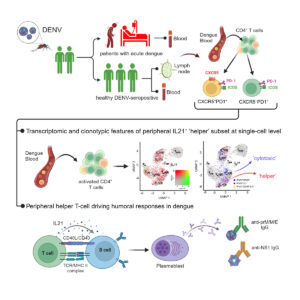Our research sheds light on the previously unknown aspect of how humans produce antibody response to dengue virus. The study uncovers a new immune pathway that could change how we predict and treat severe dengue infections, and how dengue vaccines should be designed.
This study focused on understanding how the immune system, mainly T cells, responds to dengue virus and why do some individuals experience mild symptoms while others develop life-threatening complications? By studying dengue patients, our team identified a new type of T cells that plays a crucial role in shaping the antibody response to dengue virus. Based on the single-cell insights, the study marked these new cells as a unique IL21+ T-cell subset. These newly identified IL-21+ T cells were found in higher numbers in severe dengue cases. Instead of offering protection, they trigger an excessive and uncontrolled antibody response, leading to immune system overactivation, which might have worsened the disease. Even more striking, our study of human lymphoid tissues revealed that these immune cells don’t just circulate in the bloodstream but also migrate to lymph nodes and potentially peripheral tissues, negatively influencing the quality of immunity to dengue virus

